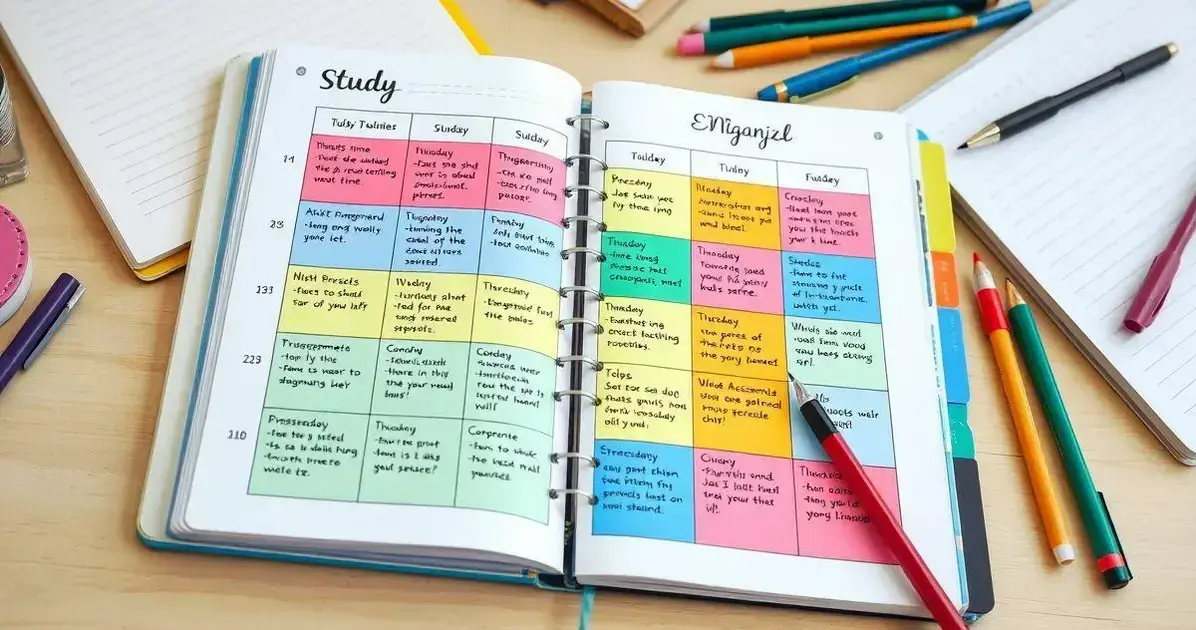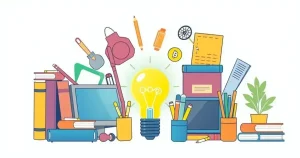Anúncios
Study tips are essential tools that can help students excel in their academic pursuits.
By implementing effective techniques and strategies, learners can enhance their productivity and deepen their understanding of the material.
From creating a structured schedule to utilizing helpful resources, discover how these techniques can unlock your true learning potential.
Anúncios
Understanding the Importance of Study Tips
Understanding the importance of study tips can make a big difference in how well you learn.
When students use effective techniques, they find it easier to remember information and tackle challenging subjects.
These tips help in organizing material and focusing on what really matters for success.
Anúncios
By applying study tips, students can also manage their time better. This means less stress and more confidence during exams.
Good study strategies can lead to better grades, which boosts motivation and creates a positive cycle of learning.
Moreover, study tips encourage independence and critical thinking.
When students take control of how they learn, they become more engaged with the material.
This skill not only helps in school but also prepares them for future challenges in life.
Effective Study Techniques for Better Retention
Using effective study techniques is key to better retention of information. One popular method is the use of flashcards.
Students can create these cards to test their memory on important terms or concepts—study tips like this improve retention and make learning more effective.
By actively recalling the information, they strengthen their memory and make it easier to remember later.
Another great technique is the Pomodoro Technique. This method encourages students to study for a set time, usually 25 minutes, followed by a short break.
By breaking study sessions into manageable parts, students can keep their minds fresh and focused, which helps with retaining what they learn.
Moreover, teaching others what you have learned is an excellent way to improve retention.
When students explain concepts to their peers, they reinforce their own understanding.
This technique not only helps in remembering information but also builds confidence in their knowledge.
How to Create a Study Schedule

Creating a study schedule is an important step in managing your time effectively. Start by listing all the subjects or topics you need to study.
Next, decide how much time you want to dedicate to each subject each week. This helps ensure you cover everything without feeling overwhelmed.
Once you have your subjects, use study tips to choose specific times during the day to study—preferably when you feel most alert and focused.
For example, some students find they learn better in the mornings, while others prefer studying in the evening.
Stick to your schedule as much as possible to build a consistent routine.
Finally, remember to include breaks and relaxation in your schedule. Taking short breaks helps your brain rest and process information better.
Enjoying downtime will also keep you motivated and ready to learn again when you get back to studying.
Tools and Resources for Studying
There are many tools and resources for studying that can help you learn more effectively.
Online platforms like Khan Academy or Quizlet, when combined with effective study tips, provide a wealth of information and practice exercises for various subjects.
These resources make studying more interactive and enjoyable, allowing you to learn at your own pace.
In addition to online resources, consider using apps designed to help with organization and time management.
Apps like Trello or Notion can keep your study materials and schedules in one place.
This way, you can stay organized and focused on your learning goals without feeling lost or stressed.
Don’t forget about traditional study aids, such as notebooks and planners.
Writing notes by hand can help reinforce what you learn, while a planner keeps track of important dates and deadlines.
Combining digital tools with traditional methods can create a powerful study routine that fits your personal style.
Avoiding Common Study Pitfalls
Avoiding common study pitfalls can greatly improve your learning experience. One major pitfall is procrastination.
It’s easy to put off studying until the last minute, but using smart study tips can help reduce stress and improve your ability to retain information.
Instead, create a study schedule and stick to it, so you can pace yourself and stay on track.
Another common mistake is studying in a distracting environment. Noise, clutter, and interruptions can make it difficult to focus.
Find a quiet space where you can concentrate fully on your studies.
This will help you absorb the material better and get more done in a shorter amount of time.
Finally, some students make the mistake of not asking for help when they need it. If you’re struggling with a subject, seek assistance from teachers or classmates.
Joining study groups can also provide support and different perspectives. Don’t hesitate to reach out; getting help can prevent confusion and boost your understanding.
Maximizing Your Study Environment

Maximizing your study environment is important for effective learning. Start by choosing a location that is quiet and free from distractions.
A clean, organized desk with good lighting can help you stay focused; study tips like using a comfortable chair that supports good posture also make a difference.
This encourages longer study sessions without discomfort.
Another key factor in your study environment is having all necessary materials close at hand.
Keep your books, notes, and any supplies you might need organized and within reach.
This saves time and keeps you from losing focus while searching for items. Being prepared makes studying smoother and more efficient.
Finally, consider personalizing your study space with things that inspire you. Adding a plant, artwork, or motivational quotes can create a positive atmosphere.
Surrounding yourself with items that uplift you can boost your mood and make learning more enjoyable. Finding joy in your environment can help unlock your learning potential.
It seems that no specific subtitle was provided for the content. However, I can focus on useful study tips that can help students maximize their learning potential.
First, setting clear goals is essential. When students know what they want to achieve, they can better direct their study efforts.
This focus can significantly enhance productivity during study sessions.
Another important aspect is to change up study methods.
Using various techniques, like visual aids, group discussions, or practice tests, can make learning more engaging.
When students mix different study styles, it can help reinforce what they’ve learned and keep them motivated.
Lastly, regular reviews of material help solidify knowledge. Instead of cramming right before exams, students should revisit their notes and concepts regularly.
This consistent review can boost memory retention and make students feel more confident in their understanding of the material.







